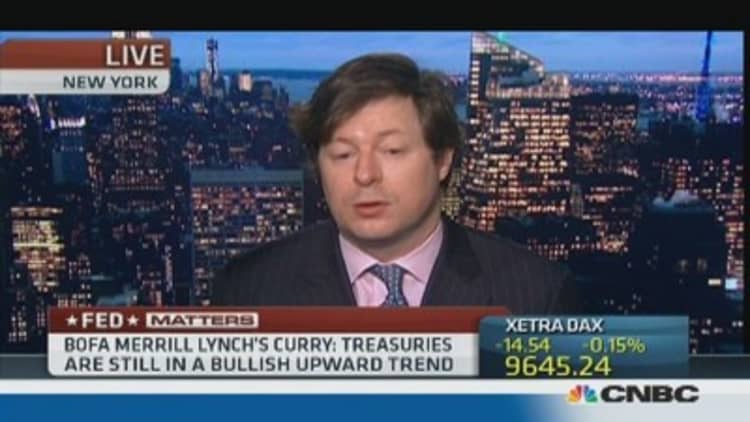The prospect of rising interest rates is weighing heavily on the minds of fixed-income investors as the Federal Reserve scales back its massive bond-buying program, thanks to a strengthening U.S. economy.
Yet it wasn't long ago that investors worried that the Fed's stimulus efforts would lead to stronger inflation, which can be particularly problematic for retirees or those nearing retirement, given their relatively short investment horizons.
The inflationary fears that loomed just a few years ago led to a surge in the popularity of Treasury Inflation-Protected Securities, a relatively new bond class intended to preserve the purchasing power of interest income and maturing principal during inflationary periods. Between 2008 and 2010, assets under management in open-end, inflation-protected mutual and exchange-traded funds nearly doubled, to about $105 billion, according to research firm Morningstar.
Last year, however, the tide turned for TIPS, which, like conventional Treasurys, have a high degree of so-called interest-rate risk. Bonds or stocks with a high level of interest-rate risk are likely to fall in value if interest rates rise, as they did in 2013. TIPS experienced a selloff last year, when inflation-protected mutual and exchange-traded funds had net outflows of just over $34 billion, Morningstar reports.
(Read more: Rates rise aside, bonds still a good bet)
"The rise in interest rates that we have experienced during the last year and a half is tied to the fact that people expect the Fed to scale back on its stimulus efforts, not because we have seen inflation tick up," said Scott Cameron, a chartered financial analyst and principal at the Multnomah Group.

With inflation expected to remain benign and interest rates to rise, TIPS aren't expected to enjoy another honeymoon anytime soon. Yet at their current depressed prices, TIPS may appeal to investors seeking an inexpensive way to hedge diversified portfolios against unforeseen spikes in inflation.
"If everybody thinks there is going to be stronger inflation going forward, TIPS prices are going to be bid up," said Eric Jacobson, a senior analyst at Morningstar.
"However, the best time to buy them is when they are cheap and people aren't really that worried about inflation," he said.
"If you had been sitting on the sidelines worrying that TIPS were too expensive, it is probably not a bad time to start accumulating them if you are at the least bit worried about inflation going forward," Jacobson added.
TIPS pay a fixed rate of interest—set at the time of issuance and based on real interest rates—twice a year on their principal value. Their principal increases with inflation and decreases with deflation, as measured by the U.S. Bureau of Labor's Consumer Price Index. When a TIPS bond matures, investors are paid the adjusted principal or original principal, whichever is greater, according to the U.S. Treasury, which first issued TIPS in 1997.
(Read more: Bond outlook dim, investors turn to alternatives)
Like traditional Treasury bonds, TIPS are a good hedge against equities. However, unlike traditional Treasurys, they aren't subject to the risk that inflation will erode the value of the interest they pay, according to Cameron. Because the principal value of TIPS adjusts for inflation, TIPS yields are usually lower than nominal Treasury yields.
"If inflation is above market expectations, TIPS investors end up winning compared to folks investing in Treasurys," Cameron explained. "TIPS tend to provide a good hedge against unexpected increases in inflation."
Investors can gain exposure to TIPS either by buying them directly (from the U.S. Treasury, a bank or broker) or through mutual and exchange-traded funds. Funds that own shorter-maturity TIPS generally have less interest-rate risk than funds owning longer-maturity TIPS, but they also have lower total-return expectations.
"The question for clients becomes, Do they want to pay, in terms of giving up yield, to avoid interest-rate risk or take on more volatility and get better, long-term real returns?" said Cameron, noting that the answer depends on their objectives and time horizons.
TIPS have been disappointing because they acted as if they were traditional Treasurys.Richard Kagawacertified financial planner, Capital Resources & Insurance
Like other funds, those that own TIPS can suffer losses, particularly if managers are forced to sell holdings at an inopportune time to meet significant redemptions. Last year inflation-protect bond mutual and exchange-traded funds took a hit, declining by nearly 8 percent, according to Morningstar. In 2011 and 2012, such funds gained nearly 11 percent and about 7 percent on average, respectively.
Despite negative sentiment surrounding TIPS, financial advisors say the bonds might make sense for investors who have specific upcoming needs, such as paying for college. "You buy a TIP that matures within your time frame and you get this free hedge against inflation, which at this point doesn't seem to be a major concern," said Christopher Krell, a certified financial planner and principal at Cassaday & Co.
Some advisors have significantly scaled back their clients' TIPS exposure because of the volatility in the sector over the past year.
(Read more: Ready to bail on bonds? Not so fast)
Richard Kagawa, a certified financial planner with Capital Resources & Insurance, bought TIPS for clients as a cash equivalent in early 2010, gaining exposure to the sector through an exchange-traded fund. He said he expected TIPS to "cushion" client portfolios in case the Troubled Asset Relief Program and other government stimulus programs fueled inflation.
Kagawa said his clients made money on their TIPS investments, but he has dialed back their exposure significantly or pulled them out of the sector entirely over the past year. "TIPS have been disappointing because they acted as if they were traditional Treasurys," he said.
—By Anna Robaton, Special to CNBC.com




